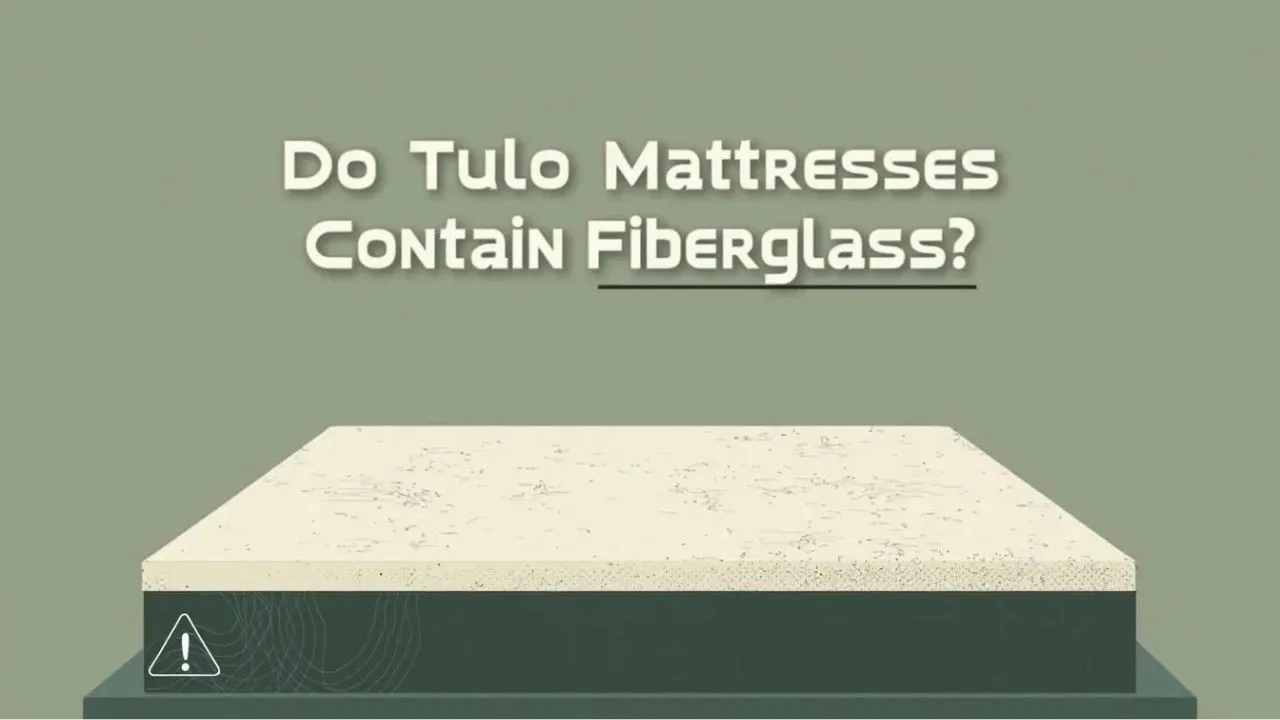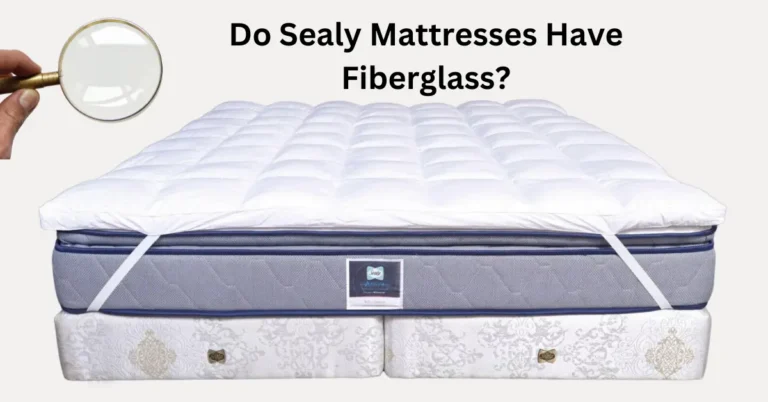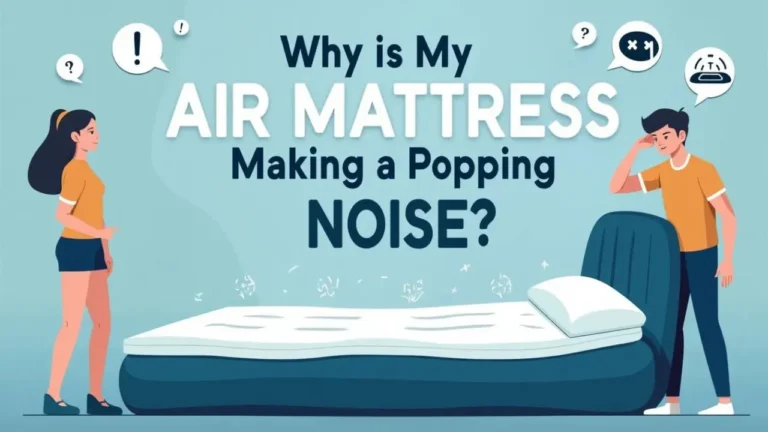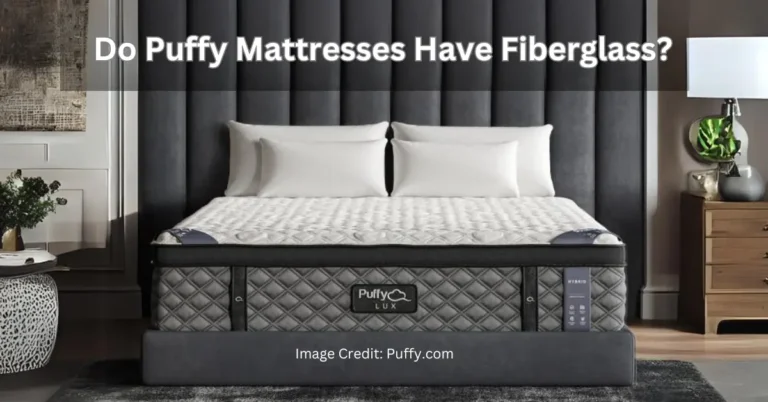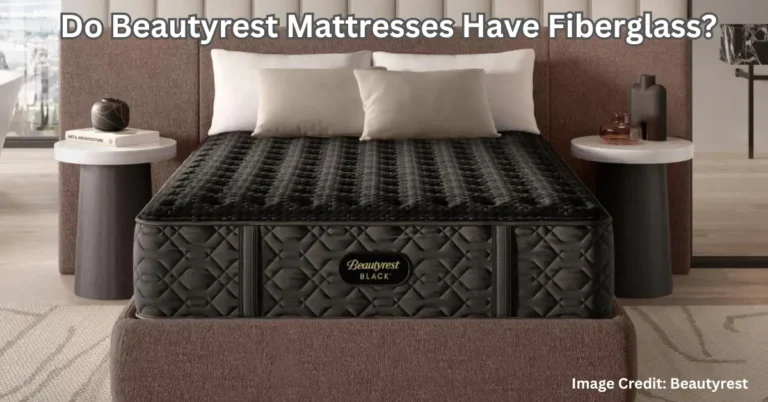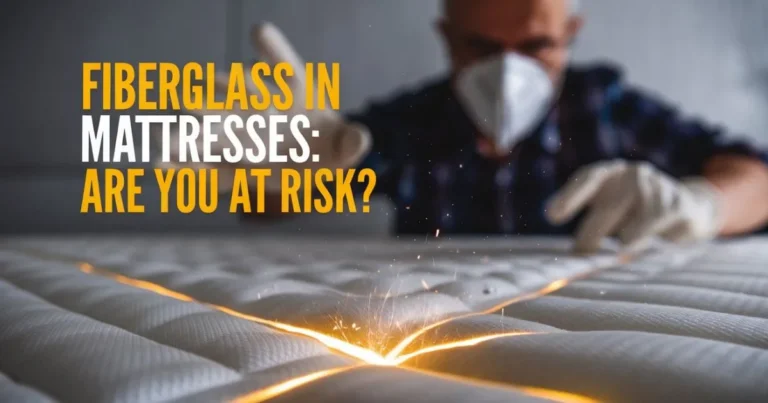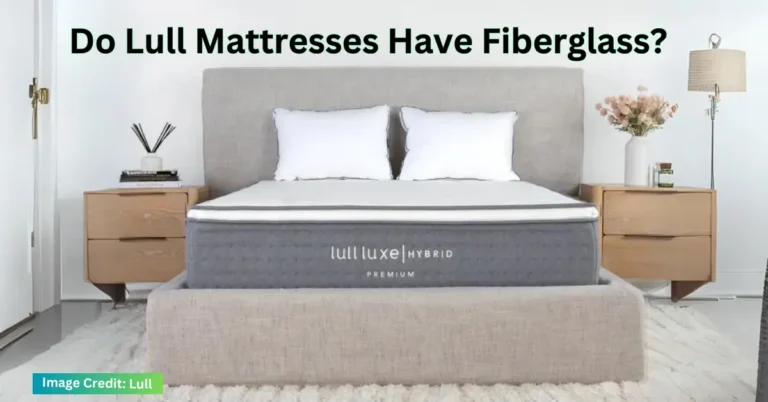Do Tulo Mattresses have Fiberglass? Here’s the Answer
After a long day, you all look forward to relaxing on your mattresses.
But what if there’s something hidden inside?
Many people are concerned about whether Tulo mattresses have fiberglass, which is important for those who want a safe and healthy sleep.
Tulo mattresses are popular because they’re affordable and sold at Mattress Firm, but this brings up questions about their safety.
Do Tulo mattresses have fiberglass, or are they free from harmful materials?
Let’s dive into this concern to help you make the best choice for a safe and comfortable night’s sleep.
Key Takeaways
What is Fiberglass in Mattresses?
Fiberglass is a material often used in mattresses, and it’s important to understand why. It’s made from tiny glass fibers and is also known as glass-reinforced plastic (GRP) or glass-fiber-reinforced plastic (GFRP).
These fine glass fibers are woven into fabric-like mats or used as a reinforcement in different products due to their strength and flexibility.
You’ll find fiberglass used in many industries, from construction to aerospace, because it’s lightweight, durable, and resistant to degradation.
What is the Purpose of Fiberglass in Mattresses?
Fiberglass is commonly used in mattresses for two main reasons:
- Fire Safety: Mattresses must meet fire safety standards, and fiberglass is effective because it can resist heat and slow the spread of fire. This makes it a reliable fire retardant.
- Cost-Effectiveness: Fiberglass is a low-cost material, which helps manufacturers keep production costs down. This makes mattresses more affordable for consumers.
However, despite its benefits, fiberglass in mattresses has raised concerns. When a mattress cover is damaged or removed, tiny fiberglass particles can escape.
These particles can cause health problems like skin irritation, eye injuries, or lung issues, especially if you come into direct contact with them.
That’s why handling mattresses containing fiberglass with care is so important.
What are the Risks and Allergies Associated with Fiberglass?
Fiberglass, made from tiny glass fibers, is often used in products like mattresses to meet fire safety standards.
However, fiberglass can pose several health risks, especially if the fibers become airborne or come into direct contact with your skin.
- Skin Irritation: Exposure to fiberglass can cause itching, redness, and rashes. The tiny fibers may get embedded in the skin, causing significant discomfort.
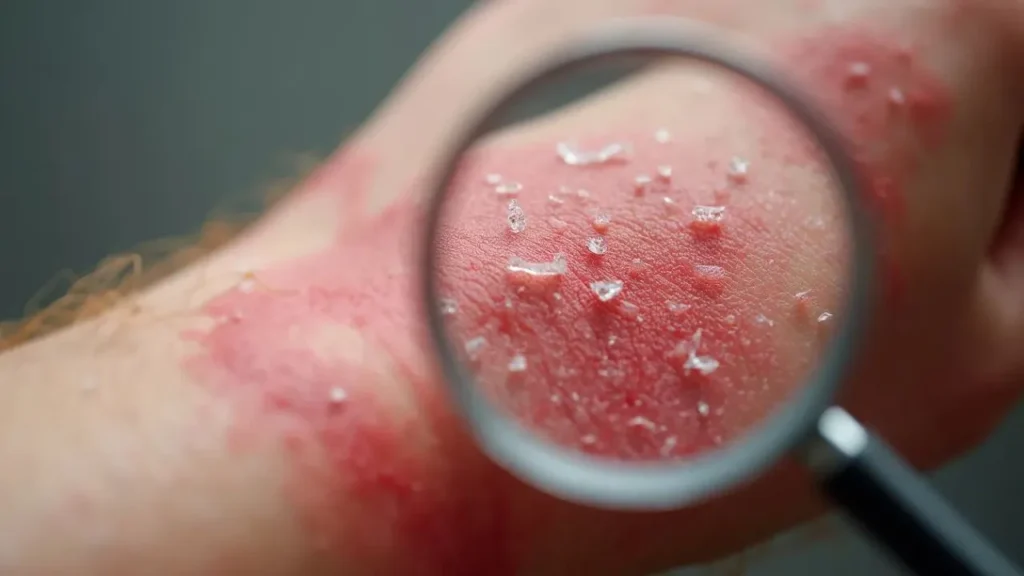
- Respiratory Issues: Inhaling fiberglass particles can irritate the respiratory system, leading to coughing, wheezing, and difficulty breathing. For those with asthma or bronchitis, long-term exposure can worsen these conditions.

- Eye Irritation: Contact with fiberglass can cause eye redness and irritation, which can be uncomfortable and hard to manage.

- Lung Disease: A Research shows that short-term exposure to fiberglass is associated with lung inflammation, and continued exposure may lead to more serious health issues, such as lung disease.

NOTE
If you’d like to learn more about the link between fiberglass exposure and respiratory health, you can check out this research study published in the Clinical Pulmonary Medicine Journal.
Overview of Tulo Mattresses
Tulo is a brand known for offering high-quality mattresses at affordable prices, available exclusively at Mattress Firm.
Their mattresses feature a four-layer design and come in soft, medium, and firm options, making it easy for different sleepers to find one that fits their sleep style.
What is Tulo Mattress?
Tulo focuses on providing affordable and comfortable mattresses for a wide range of sleepers.
- Prices range from $375 to $800, making Tulo a great option for budget-conscious shoppers.
- For example, a Queen-size Tulo mattress costs around $650, which is cheaper compared to a Casper mattress at $950.
- Tulo also offers a 120-night trial and a 10-year warranty, showing their commitment to customer satisfaction.
This gives buyers peace of mind, knowing they can return the mattress if it’s not the right fit.
Tulo’s Popularity and Affordability
Tulo has gained popularity because of its great prices and excellent value for money.
- Customers frequently mention how the mattress is easy to set up and provides comfort and motion isolation, which is especially helpful for people with conditions like arthritis.
- Tulo mattresses are designed to keep sleepers cool, which is essential for a restful night.
- With a customer satisfaction score of 4.0 out of 5, Tulo is a top contender in the affordable mattress market.
Do Tulo Mattresses Have Fiberglass?
According to information from Mattress Firm, Tulo mattresses do contain fiberglass. This fiberglass is used in a fire sock to improve the mattress’s fire safety.
Understanding this helps clear up any confusion and highlights the importance of checking a mattress’s safety features before purchasing.
Confirmation from Mattress Firm
When we contacted Mattress Firm’s support team through their official website, they provided some important information.

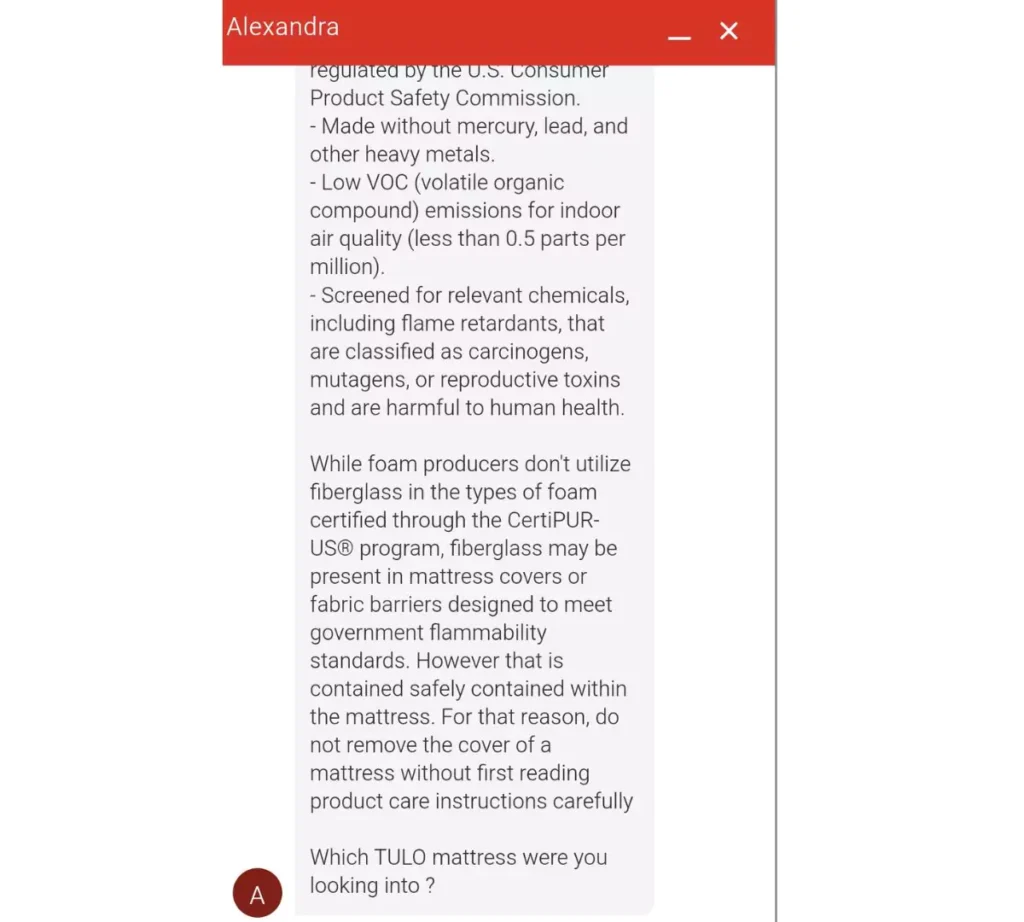
They confirmed that Tulo mattresses are CertiPUR-US certified, meaning their foams meet strict standards for health and safety.
Here are some key points about CertiPUR-US certified foams:
- Made without formaldehyde.
- Made without ozone depleters.
- Made without phthalates (regulated by the U.S. Consumer Product Safety Commission).
- Made without mercury, lead, or other heavy metals.
- Low VOC emissions (less than 0.5 parts per million), meaning better indoor air quality.
- Screened for harmful chemicals, including flame retardants that are classified as carcinogens, mutagens, or reproductive toxins.
Although the foams in Tulo mattresses don’t contain fiberglass, fiberglass may be present in the mattress covers or fabric barriers to meet government flammability standards.
This is important to know because the fiberglass is not part of the foam itself but can still be used in other components of the mattress to enhance safety.
Common Misconceptions About Tulo Mattresses
Despite clear information, there are still some common misconceptions about Tulo mattresses. Some people believe that Tulo mattresses do not contain fiberglass, but this is not accurate.
What is a Tulo Mattress Made Of?
A Tulo mattress is made with a combination of materials designed to provide both comfort and support.
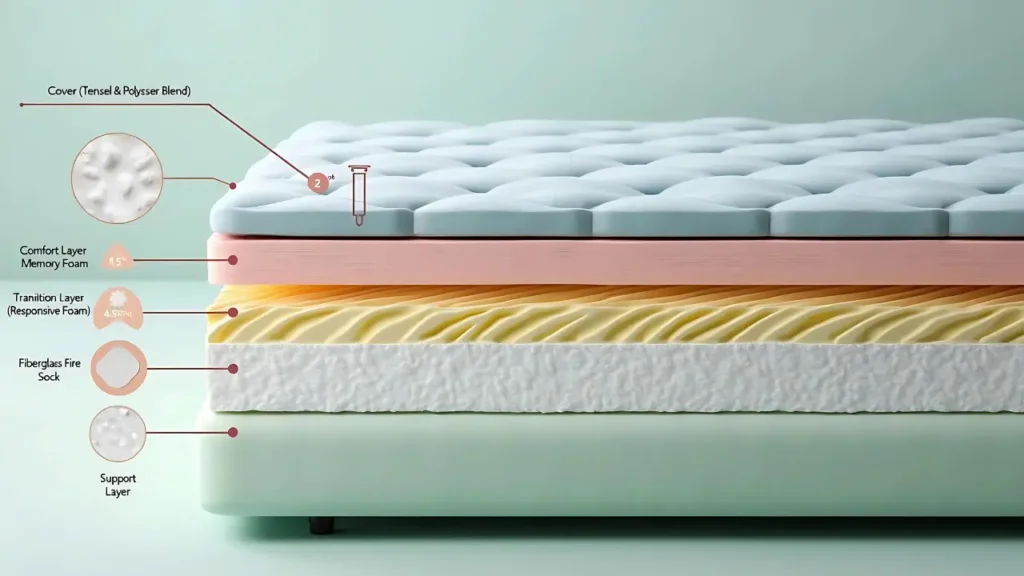
Here are the materials used in Tulo mattresses:
| Layer | Material | Function |
| Cover | Tencel and polyester blend | Soft, breathable surface for comfort and cooling |
| Comfort Layer | 2″ gel-infused memory foam | Pressure relief and motion isolation |
| Transition Layer | 1.5″ responsive foam | Airflow and temperature regulation |
| Support Layer | 4.5″ high-density polyurethane foam | Spinal alignment and durability |
Materials and Layers
- Cover: The outer cover is soft and breathable, made from a blend of Tencel (a fabric from wood pulp) and polyester. This helps keep the mattress cool while providing a comfortable surface.
- Comfort Layer: The top layer is 2 inches of gel-infused memory foam. This foam molds to your body for pressure relief and reduces motion transfer, which is perfect if you share your bed.
- Transition Layer: Under the comfort layer, there’s a 1.5-inch responsive foam with a “peak and valley” design to promote airflow, helping regulate temperature and keep the mattress cool.
- Support Layer: The base of the mattress is made from high-density polyurethane foam, which provides long-lasting support and ensures proper spinal alignment. This 4.5-inch layer adds durability to the mattress.
- Additional Features: Some Tulo mattresses also include titanium particles in the foam to increase durability and help keep the mattress cool.
Materials Used in Tulo Mattresses
Tulo mattresses are made with high-quality foams like high-density foam, memory foam, and support foam, which all contribute to both comfort and durability.
These foams are CertiPUR-US certified, meaning they meet strict safety and environmental standards by being free of harmful chemicals.
Flammability Standards and Safety Features
To meet flammability regulations, many Tulo mattresses have fiberglass fire-resistant (FR) socks or other flame-retardant materials.
These safety features help prevent fires by making it harder for the mattress to ignite.
While fiberglass is an effective fire barrier, it can cause skin irritation and create a mess if the cover is damaged.
NOTE
There have been reports of health issues linked to fiberglass in mattresses, with some people even filing lawsuits over the harm caused.
Different Models
Tulo mattresses come in different sizes, like 6, 8, 10, and 12 inches thick. The main difference between them is how thick the support layer is.
You can also choose how soft or firm you want your mattress to be, whether you prefer something soft, medium, or firm, depending on what feels most comfortable for you.
Certifications
All foams used in Tulo mattresses are CertiPUR-US certified, ensuring they are made without harmful chemicals and have low VOC emissions.
This certification guarantees a safer, more environmentally responsible sleep experience.
How to Identify Fiberglass in Mattresses?
When you’re choosing a mattress, you want to make sure it doesn’t contain fiberglass, which can be a hidden health risk. Here are some practical steps to help you check if a mattress, like a Tulo, contains fiberglass:
Check the Mattress Label and Certifications
- Read the Label: By law, manufacturers must list the materials used in the mattress and the percentage of each. If you see “XX% glass fiber” or “fiberglass,” it means the mattress contains fiberglass.
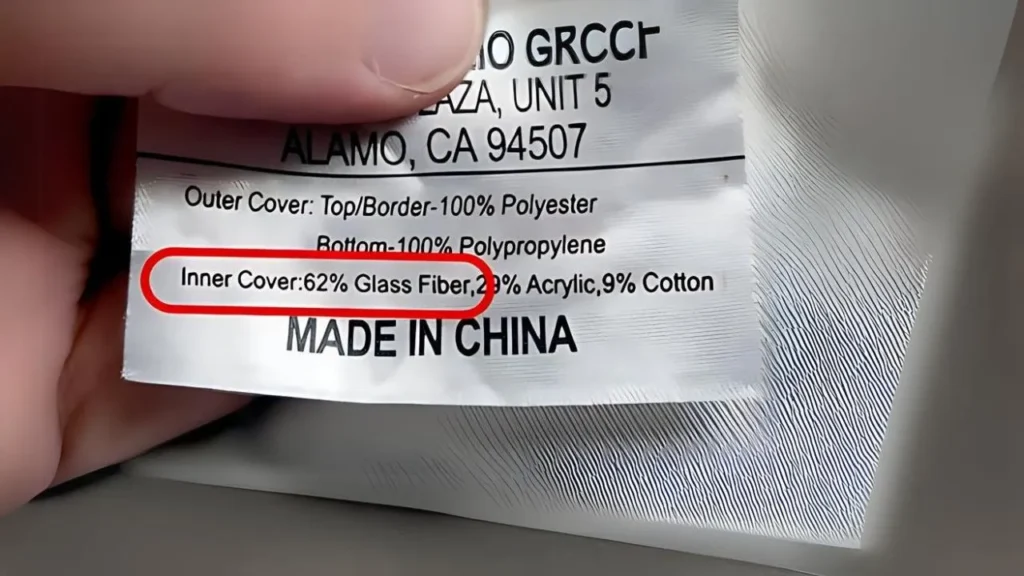
- Look for Other Terms: Sometimes manufacturers use different words to refer to fiberglass, like “glass wool” or “glass fibers,” which can be misleading. These terms also suggest fiberglass is present.
- Look for Certifications: While certifications like CertiPUR-US, GOTS, or OEKO-TEX don’t always confirm the absence of fiberglass, they do show the mattress meets specific safety and environmental standards.
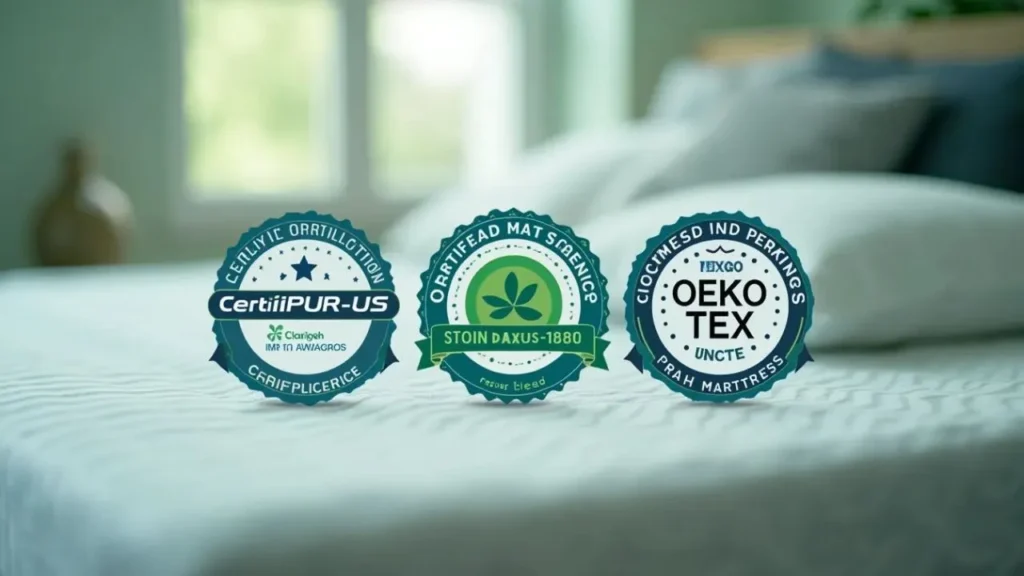
Extra Tips for Spotting Fiberglass
If you’re still unsure, here are more ways to identify fiberglass in a mattress:
- Inspect the Mattress Cover: If the cover is removable, check inside. If you find a white, fluffy, translucent material that looks like wool batting or threads woven together, it’s probably fiberglass. Also, if the label warns against removing the cover, this could be a sign that fiberglass is inside.
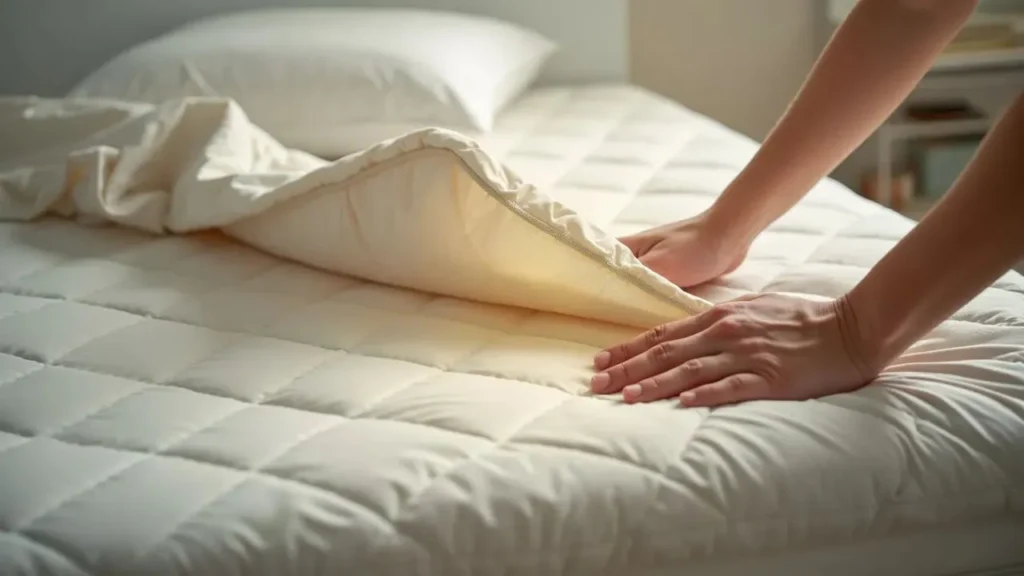
- Contact the Manufacturer: If the label isn’t clear or you have doubts, don’t hesitate to reach out to the manufacturer and ask directly about the materials.

- Read Product Reviews: Customer reviews can be a great source of information. Many buyers will share if they discovered fiberglass in their mattress, so reading reviews can give you a heads-up.

NOTE
Fiberglass is used for fire safety in some mattresses, it can cause irritation and other health issues if exposed. It’s important to do a bit of research before making a purchase to ensure you’re choosing a safe mattress for your home.
Are Tulo Mattresses Safe?
If you’re wondering about the safety of Tulo mattresses, let’s break it down. Tulo has made statements about their mattresses being safe and meeting safety standards.
They mention using a fiberglass fire sock to prevent fires, which is common in many mattresses.
However, there’s still a chance that fiberglass could escape if the mattress is damaged, so it is important to handle your mattress with care.
Official Statements About Safety
Tulo mattresses use some natural materials, like bamboo-based rayon for the cover, and they don’t seem to use fiberglass in the cover itself.
However, there isn’t clear information about whether the foam layers inside contain fiberglass.
The mattresses do have a CertiPUR-US certification, which means they don’t contain harmful chemicals like formaldehyde or heavy metals. But this certification doesn’t mention anything about fiberglass.
Why Mattress Covers Matter?
One way to protect yourself is by using a good mattress cover. A cover can help prevent damage to your mattress, which could release harmful materials, like fiberglass.
It also helps your mattress last longer and stay in better condition. It’s a good idea to check your mattress cover regularly for any signs of wear and tear, so you can catch any issues before they become a problem.
Tulo vs. Fiberglass-Free Alternatives: A Comparative Analysis
When choosing a mattress, it’s important to consider factors like comfort, price, and the materials used. In this comparison, we’ll explore how Tulo compares to fiberglass-free alternatives like Saatva and Sunrising Bedding, along with some key statistics about the growing trend toward fiberglass-free mattresses.
Current Industry Trends related to Fiberglass Usage
A recent study analyzed 266 mattresses, which revealed that 79% of them do not use fiberglass as a fire retardant, while 11.8% were found to contain fiberglass, and 5.3% had unclear labeling regarding fiberglass content.
This trend shows that more companies are responding to consumer demand for safer mattress options, using alternative fire-retardant materials like natural fibers, wool, or silica.
Brands such as Amerisleep, Avocado, and Saatva have eliminated fiberglass from their mattresses, focusing on safety and transparency.
Tulo Fiberglass-free Alternatives
Saatva offers a traditional innerspring mattress, the Saatva Classic, which includes a quilted organic cotton cover, a Eurotop, and a natural flame barrier, making it a fiberglass-free option. Saatva is praised for its customer service and white-glove delivery.
Sunrising Bedding provides a natural latex mattress, known for comfort and affordability, making it a great alternative to fiberglass-based options.
Features, Prices, and Consumer Reviews
Tulo Mattresses are made in the USA with CertiPUR-US certified foam and come in both hybrid and all-foam models, priced between $279 and $1,299. They have a consumer rating of 8.4/10, offering a good balance of affordability and satisfaction.
- Saatva offers mattresses priced from $935 for a twin to $1,932 for a California King. While Saatva is often praised for comfort, some users report sagging over time.
- Sunrising Bedding offers a natural latex mattress with prices ranging from $356 to $489. Reviews are generally positive, highlighting the mattress’s comfort and value for money.
The Shift Toward Safer Mattresses
This shift away from fiberglass reflects growing consumer awareness and a demand for healthier, safer bedding products.
Brands like Amerisleep, Avocado, and Saatva are leading the charge in eliminating fiberglass and offering transparent, eco-friendly alternatives. This trend makes it easier for consumers to find safer mattresses that fit their needs.
pRO TIP
If you prioritize affordability and variety, Tulo may be a good option, but if you’re looking for a luxury experience or a natural, fiberglass-free mattress, brands like Saatva and Sunrising Bedding stand out.
Final Thoughts
Tulo mattresses do contain fiberglass as part of their fire safety features. While fiberglass helps prevent fires, it’s important to handle your mattress with care to avoid any issues, especially if the cover gets damaged.
Fiberglass exposure can cause skin irritation, respiratory problems, and other health concerns if fibers become airborne.
Always check your mattress label to know what materials are inside, and if you’re ever unsure, reach out to the manufacturer for confirmation.
If you’re concerned about fiberglass, consider using a high-quality mattress cover or exploring fiberglass-free alternatives.
Taking these precautions can help you sleep peacefully, knowing you’re making the safest choice for your home.
Frequently Asked Questions (FAQs)
-
Do Tulo mattresses have fiberglass?
Yes, Tulo mattresses have fiberglass for fire safety. It’s in a special fire sock inside the mattress.
-
What materials are used in Tulo mattresses?
Tulo mattresses use high-density foam, memory foam, and other support foams. These materials are certified by CertiPUR-US for safety and the environment.
-
Is Tulo a memory foam?
Yes, Tulo is a memory foam mattress. It’s designed with multiple layers of foam to provide comfort and support. The brand offers different firmness levels to cater to various sleep preferences.
-
Why do mattresses use fiberglass?
Mattresses use fiberglass as a cost-effective way to fight fires. It meets the US safety standards set by the CPSC.
-
What are the potential health risks associated with fiberglass?
Being around fiberglass can cause skin problems, breathing issues, and allergies. It can also spread in the air, making people uncomfortable and possibly contaminated.
-
Are Tulo mattresses safe for consumers?
Tulo mattresses follow safety rules, but it’s important for users to watch out for fiberglass. This is especially true if the mattress cover gets damaged.
-
What do customer testimonials say about Tulo mattresses and fiberglass?
Customers have shared worries about fiberglass in Tulo mattresses. They talk about skin rashes and irritation from the mattress cover.
-
What are some alternatives to Tulo mattresses that do not contain fiberglass?
Brands like Sunrising Bedding and Avocado offer mattresses without fiberglass. They use natural flame retardants like organic wool instead.

About Khalid Ansari
Khalid has a deep understanding of the challenges of getting a good night’s sleep, gained through years of personal experience and extensive research. At Slumberaddicts, he shares his expertise on sleep products, from mattresses to natural sleep aids, helping lead the editorial team. Khalid is passionate about helping others improve their sleep quality through practical advice and product reviews. When he’s not testing the latest sleep innovations, Khalid loves traveling, reading books, and watching cricket.

About Khalid Ansari
Khalid has a deep understanding of the challenges of getting a good night’s sleep, gained through years of personal experience and extensive research. At Slumberaddicts, he shares his expertise on sleep products, from mattresses to natural sleep aids, helping lead the editorial team. Khalid is passionate about helping others improve their sleep quality through practical advice and tips. When he’s not testing the latest sleep innovations, Khalid loves traveling, reading books, and watching cricket, enjoying every moment with family and friends.

